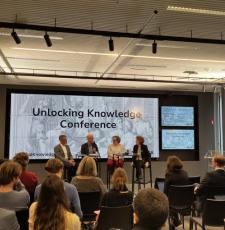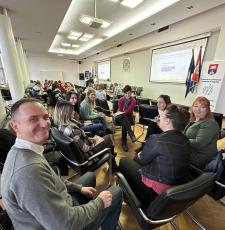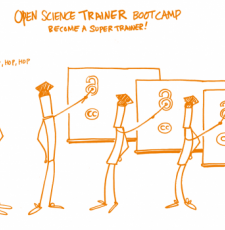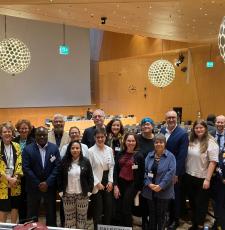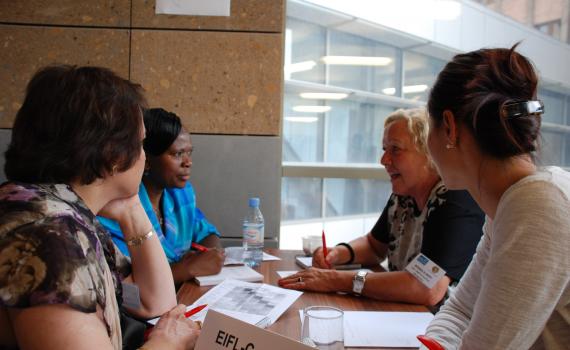
EIFL works with library consortia in more than 46 countries to help build their organisational skills and capacity to cooperate in sharing online resources, skills and services. This, in turn, enhances their members’ ability to deliver effective information services and programmes.
“Over the last 14 years, EIFL has been a strong supporter of library consortia,” explained Rima Kupryte, Director of EIFL.
All seven library consortiums received EIFL’s support to establish their consortium – and a decade later – can now report strong growth and a number of achievements in improving access to knowledge.
“EIFL would like to congratulate all seven library consortia on 10 years of success,” said Kupryte.“We wish them many more years of accomplishments and achievements.”
A look back
Azerbaijan Library Information Consortium (Az.LIC) was established by the Scientific Library at Baku State University, one of the largest academic institutions in Azerbaijan.
“At the time, developing and transition countries faced problems due to a lack of resources supporting education and research,” explained Jamila Yusifova, EIFL Country Coordinator for Azerbaijan.
“The lack of funding didn’t allow these resources to be distributed as widely as possible and online resources were not as widely used.”
When the Lesotho Library Consortium (LELICO) was founded, librarians in Lesotho faced a similar issue.
“There was a limited understanding of what library consortia are supposed to do,” remembers Tseli Moshoeshoe-Chadzingwa, the LELICO chairperson and member of the EIFL Advisory Board.
“At that time, no one could ever have predicted that a library in Lesotho would be providing electronic information to clients. In fact, the issue of electronic information was almost unheard of.”
For Karmen Štular Sotošek, EIFL Country Coordinator for Slovenia and first executive director of the Consortium of Slovene Electronic Collections (COSEC), the issue was around access.
“EIFL offered international information resources that had not yet been available in Slovenian libraries and public research institutions,” remembers Sotošek.
Improving access to knowledge
Access to knowledge is fundamental to education and research, and thereby socio-economic development.
Over the past decade, through the efforts of EIFL-partner library consortia, more libraries and their users now have access to high quality online resources, giving their member libraries and users more access to knowledge online.
 Each country library consortia now offers between 20 to 80 electronic resource subscriptions, which include databases, e-journals, e-references and e-books.
Each country library consortia now offers between 20 to 80 electronic resource subscriptions, which include databases, e-journals, e-references and e-books.
All seven consortia have seen tremendous growth in membership.
“Our leadership has great enthusiasm towards building essential programs and initiatives directed toward constantly expanding membership and interest,” said Miodrag Dadasovic, National Coordinator of the Macedonian Electronic Libraries (MEL) and EIFL Advisory Board member.
Derib Erget, the EIFL country coordinator for Ethiopia, agrees.
“The Consortium of Ethiopian Academic and Research Libraries (CEARL) was not functioning for a number of years … but it has become stronger over time,” said Erget.
“Now we are able to share common goals, speak with one voice to policy makers, funders and are able to purchase different e-resources at a reasonable price.”
Increasing connectivity
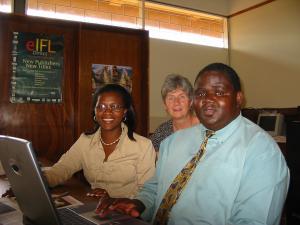
A lot has changed since the Malawi Library and Information Consortium (MALICO) first launched in the city of Blantyre.
In addition to increasing subscription to e-resources, MALICO has played a crucial role in improving Internet connectivity in Malawi.
In 2007, it was estimated that Malawi had access to over three million US dollars worth of online electronic content. However, poor Internet connectivity, mostly through dial-up modems, greatly hampered its use.
With support from EIFL, MALICO decided to act. The result was a major national infrastructure project spearheaded by librarians. Multiple stakeholders were persuaded of the value; and MALICO was able to acquire four very small aperture terminal (VSAT) sets to increase Internet bandwidth across higher education institutions in Malawi.
"The four VSAT's revolutionized access to electronic scientific information in Malawi libraries," explained Geoffrey Salanje, EIFL country coordinator of Malawi.
With higher bandwidth, more libraries, scholars are now able to access and benefit from e-resources.
Promoting OA and FOSS
When the Electronic Library Consortium of Armenia (ELCA) first launched a decade ago, the aim was simple.
“We wanted to educate librarians about how to reduce subscription fees during negotiations with publishers, and to organize awareness-raising campaigns around the benefits of consortium-negotiated prices,” said Tigran Zargaryan, EIFL Country Coordinator for Armenia and EIFL Advisory Board member.
In addition to increasing subscriptions to online resources, ELCA has done a great job promoting free and open source software (FOSS) and advocating for open access (OA).
A master’s level course on FOSS is now available to library science students and numerous FOSS projects have been implemented by ELCA member libraries. A multi-disciplinary repository has been established with 20 OA journals currently available, and two pilot OA repositories containing PhD theses and conference proceedings have been set up.
“Ten years of working with EIFL demonstrates how innovative ideas from EIFL programmes and EIFL member countries can change the vision of a library community in Armenia,” Zargaryan concludes.
EIFL and its partner consortia are most grateful to the Open Society Foundations for their long-standing commitment to libraries.
SHARE / PRINT






